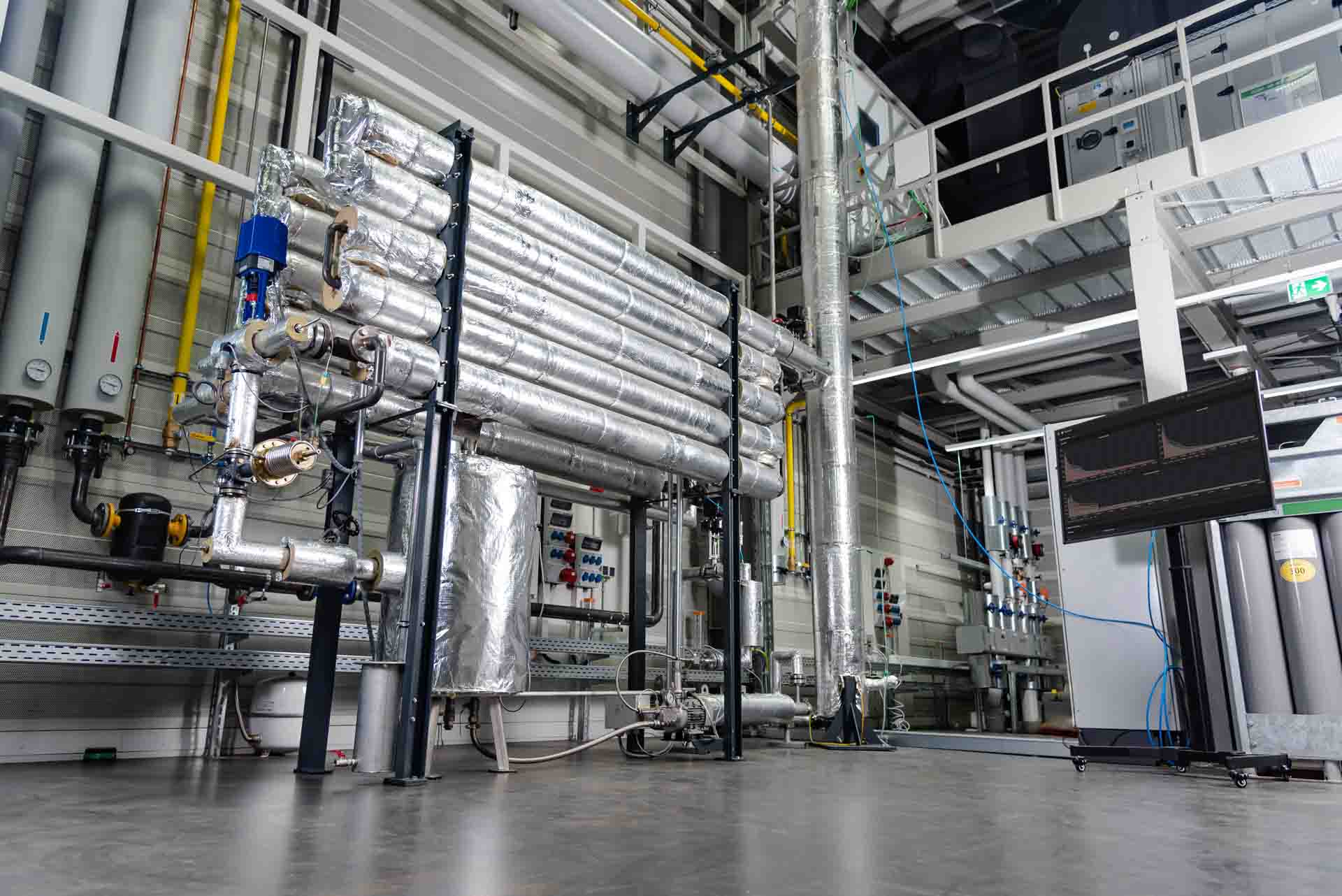Fraunhofer UMSICHT launches ISSDEMO project
The ISSDEMO project is developing an ultra-dynamic high-temperature heat storage based on a phase changing metal alloy. It is intended to provide flexible process steam from renewable energies in industry. A demonstration plant for the system is being set up and tested at the Bitburger Brewery Group. The project is funded as part of the Clean Energy Transition Partnership Joint Call 2022 and co-financed by the EU.

ISSDEMO stands for »Industrial process Steam Supply - DEMOnstration of an ultradynamic thermal energy storage« and aims to increase the proportion of renewable energies in industrial process heat generation. The focus is on heat storage for the production of process steam, an essential component of many industrial processes.
To this end, a new type of high-temperature latent heat storage system is being developed to application maturity. It is based on a so-called phase changing material (PCM), in this case a special metal alloy that changes its aggregate state from solid to liquid and vice versa. It can provide heat at a temperature level between 250°C and 500°C and generate steam from it.
Project operations and industrialization
The storage system should offer a high degree of flexibility and dynamics, making it ideal for the rapid, demand-driven generation of process steam. It is to be scaled up to a capacity of 1 MWh in the project. The demonstration plant will be installed at the Bitburger Brewery Group's headquarters in Bitburg / Germany and integrated into the process heat network there.
»The topic of energy storage is not new to us at Bitburger. We have been successfully operating steam and hot water storage systems for many years. We also participate in the balancing energy market, which we want to intensify further. To this end, the surplus electricity expected in phases from our own renewable energies or the grid is to be buffered in the planned latent heat storage system and released as process steam when required. The batch operation in brewing mode leads to partial peaks in steam consumption, which can be smoothed out by a fast-reacting latent heat storage next to the existing steam storage tank. Above all, this relieves the burden on our boiler house. For us, the high-temperature heat storage system is therefore another innovative approach to decarbonizing the brewery,« explains Christian Prechtl, Senior Project Engineer for Plant Planning at the Bitburger Brewery Group.
Initially, 300 charging and discharging cycles and 1,000 operating hours are to be completed during project operation. Felix Kugler, Group Manager for Thermal Storage and Process Heat at Fraunhofer UMSICHT, outlines the future plans: »We intend to use the experience gained from the project to bring the storage system to market maturity together with a system manufacturer. We assume that in an industrialized version, almost unlimited charging and discharging cycles and thus very long operating times can be achieved.«
Hidden heat
In developing the latent heat storage, the researchers at Fraunhofer are making use of the principle of phase transformation. When materials undergo a change in their aggregate state, for example from solid to liquid, they can store very large amounts of energy in the form of heat during their phase change. As long as the phase change is not fully completed, the temperature of the material does not rise any further despite the addition of heat; the heat added remains »hidden« (Latin »latere« = »to be hidden«).
This enables a higher energy density compared to sensitive high-temperature heat storage systems, which use solids such as concrete or gravel as storage materials but have to change their temperature in order to store heat. The development of suitable phase change materials (PCM), for example metal alloys and their encapsulation, is crucial for latent heat storage. In preliminary projects at Fraunhofer UMSICHT, suitable materials were identified, tested and patented, which are now being used for the industrial application.
Benefits for the industry
High-temperature heat storage offer several benefits for industrial applications:
- By using electricity from renewable sources to generate process steam, fossil fuels can be replaced and CO2 emissions significantly reduced.
- The storage system can react quickly to changing requirements and therefore offers a stable process steam supply.
- The existing process steam infrastructure can continue to be used, enabling cost-efficient and rapid implementation.
- The storage system can be charged on demand and thus contribute to stabilizing the power grid.
Future prospects and market launch
Following the demonstration in the beverage industry, the technology is to be scaled up and transferred to other industrial sectors such as chemicals, pulp & paper or food. Application scenarios in the relevant companies are already being developed as part of the project. Finally, the Europe-wide roll-out is to be carried out by licensing partners.
Project partners and work areas
The project is being carried out in a consortium with a total of five participating partners. The overall coordination lies with the Fraunhofer Institute UMSICHT, other partners are the Silesian University of Technology, responsible for CFD simulations and techno-economic analyses, the Universidad de Lleida, for carrying out material analyses and a comprehensive ecological assessment, the companies Build to Zero (B2Z) and PROEN Gliwice are providing support in the production and integration of the storage system and in carrying out HAZOP analyses. Bitburger Braugruppe, Freudenberg Services GmbH and Wirtschaftsverband der rheinisch-westfälischen papiererzeugenden Industrie e.V. from Germany and Sanok Rubber Company SA from Poland are participating in the project as self-financed industrial partners.
Last modified: